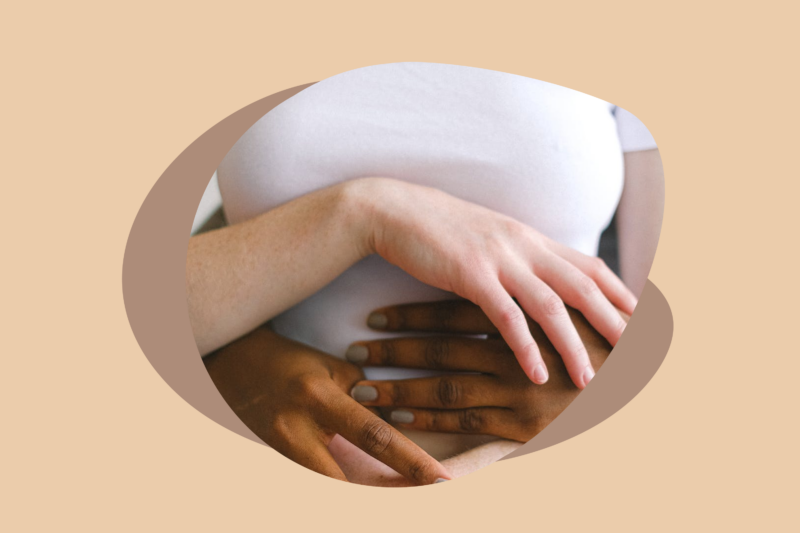Is It Easier to Get Pregnant the Second Time? Here’s What the Science Says
If you struggled to get pregnant the first time, you might be filled with a mixture of excitement and dread when you think about having a second child. The first thing you’re probably wondering is, will it be easier to get pregnant this time around?

In this post, we will look at what the science says about second pregnancies and what you can do to increase your chances of success.
Is it easier to get pregnant the second time?
The answer is that it depends.
On one hand, you may have heard that having a baby can “reset” a couple’s fertility. A 2013 study conducted at Boston University appears to support this claim. The study found that couples who had already had children were more likely to conceive than couples who had not.
However, this implies correlation, rather than causation. There is a possibility that selection bias could have influenced the results of the study: as a cohort, couples who have already had children tend to be more fertile than those who have not.
The study also excluded couples with a history of infertility. Unfortunately, many couples struggle to have a second child, especially if they have struggled with infertility due to conditions like polycystic ovarian syndrome (PCOS) in the past.
On the other hand, approximately half of all infertility cases are due to secondary infertility. Factors influencing secondary infertility include aging, sperm count, breastfeeding, weight gain, and medications.
So, yes, plenty of women are able to get pregnant a second time without issue (a few even get pregnant when they are already pregnant), but if you’re one of the few dealing with infertility then there is 50% chance it could be due to your pursuit of a second child.
When is the right time to try for a second child?
When deciding whether or not to try for a second child, there are a number of factors to keep in mind, including how long ago you had your first child and how close together you want your children to be in age.
The period between pregnancies is known as “interpregnancy.” At a minimum, the American College of Obstetricians and Gynecologists (ACOG) recommends waiting six months between pregnancies. Ideally, however, ACOG says women should wait 18 months between pregnancies to reduce the risks of adverse health outcomes for the mother and the child.
When deciding if you should start trying for a second child, consider how long it may take you to get pregnant. For couples who do not struggle with infertility, it can still take six months to a year to conceive naturally. You should also keep in mind the nine-month gestational period when determining the age gap between your children.
You can use this information to calculate when to start trying for a second child based on how close together you want your children to be in age. For example, if you want your children to be two years apart in age, you may want to start trying to conceive as soon as six to eight months after the postpartum period. Between six to eight months of record, six months to a year of conception, and nine months of pregnancy, you will give birth to your second child about two years after your first.
How long does it usually take to get pregnant again?
For women under 37 years old with no known fertility problems, 85 percent will become pregnant after a year of trying to conceive (TTC). Almost half of those women will have conceived within three months, and more than half will have conceived within six months.
Try not to compare the timing of your second pregnancy to the timing of your first. Some couples find it easier to get pregnant the second time around (maybe because they are already familiar with their unique ovulation patterns), but for many couples, it takes longer to get pregnant the second time.
In fact, secondary infertility is more common than primary infertility. It’s unclear exactly why this happens, but experts think it may have something to do with couples being older during the second pregnancy.
Is it true that the first pregnancy resets your fertility?
There’s a common saying that giving birth “resets” your fertility, making new moms ultra-fertile during the postpartum period. In reality, the truth is more complicated than that.
As you already know, women cannot conceive if they do not ovulate. How soon a new mom can conceive after birth depends on when she begins ovulating again. On average, women tend to ovulate 45 to 94 days after delivery, but it may happen sooner or later than that.
You may have heard stories of couples struggling with infertility that later went on to conceive their second child naturally. Spontaneous pregnancy is less likely, but still possible if you and/or your partner are infertile. Being infertile doesn’t mean zero chance of pregnancy — it just means much lower odds of conceiving.
However, it’s important to recognize that the majority of couples who cannot conceive naturally the first time do not go on to get pregnant a second time without medical assistance. About 17 percent of patients who have conceived through in-vitro fertilization (IVF) go on to have a second child without IVF. This is more likely to happen in women under 35.
How to prepare for the second pregnancy
Conception aside, you’ll probably find that preparing for baby #2 is much less stressful than preparing for your first child. Since you and your partner have already been through one pregnancy, you already have a lot of the supplies you’ll need for your newborn on hand.
That being said, getting pregnant with your second child comes with its own unique set of challenges. Spending your pregnancy taking care of a young child means that you’ll be busier and less likely to track every pregnancy symptom or milestone.
But before you can worry about the challenges of your second pregnancy, you need to prepare for TTC again. Here are some steps you and your partner should take to get ready for your second child:
Health check-up
If you’ve been pregnant before, you already know that your body goes through a lot during pregnancy. It’s amazing what the female body is capable of!
However, because your body has already been through a lot, you’ll want to get your doctor’s approval before trying for baby #2. Pregnancy depletes your body of much-needed nutrients, so your OB/GYN will want to make sure your body is healthy enough to support a second child.
It’s important to note that experiencing certain pregnancy complications makes you more likely to experience them again with your second (or third or fourth) pregnancy. For example, if you delivered your first born via Cesarean section, you’re often less likely to have a successful vaginal delivery the second time around. And, if you struggled with postpartum depression after baby #1, you may be likely to find yourself down after giving birth a second time.
Most of these complications may make pregnancy more challenging, but they do not mean you cannot give birth to a second healthy baby. Work with your doctor to develop a plan prior to getting pregnant a second time so you know how to handle any health problems that may arise.
Track your cycle
Depending on how long TTC took the first time, you may or may not be familiar with tracking your cycle. Many women use ovulation predictor kits (OPKs) or other fertility tracking technology when TTC. However, if your first pregnancy was spontaneous or happened fairly quickly, the idea of tracking your ovulation might be new to you.
While you are breastfeeding, you usually will not have a menstrual cycle at all. If you are menstruating, you may also find that your cycle has changed since giving birth to your first baby. Some women experience longer, heavier periods after pregnancy, which can mean longer cycles. Others find that their periods are lighter and less painful after their first pregnancy, which sometimes means shorter cycles.
It’s important to track your cycle when trying to get pregnant, even if you’ve already conceived successfully. Tracking your cycle with a fertility tracker like Mira can help you figure out your “new normal” after giving birth and more accurately pinpoint your fertile window for TTC.
Diet
The same dietary rules apply to every pregnancy, whether it is your first or your fifth. As soon as you are TTC, you should stop drinking alcohol and start taking your prenatal vitamins.
You will also want to focus on getting enough essential vitamins and minerals to support a healthy pregnancy. This is especially important if it has been less than 18 months since your first pregnancy because pregnancy depletes your body of important nutrients.
Focus on eating a diet rich in colorful, healthy foods like fresh fruits and veggies, low-fat dairy, and whole grains. For an extra boost, try adding foods rich in important pregnancy nutrients — such as folate, calcium, and iron — into your diet. Dark leafy greens, fortified whole-grain cereals, and low-fat, low-sugar dairy are all great options for a healthy pre-pregnancy diet.
Exercise
Your workout routine plays an important role in helping you maintain optimal fertility. Exercise helps you maintain a normal weight, which is essential for a healthy pregnancy. It also boosts your physical fitness levels, which can help you keep up with your toddler while juggling your second pregnancy!
Studies show that physical activity improves reproductive outcomes. In fact, pregnancy rates can be as much as two times higher in moms-to-be who maintain a regular exercise routine. However, over-exercising can be just as harmful to your fertility as under-exercising. Because exercise boosts testosterone levels, women who exercise too heavily, such as eating disorder patients who struggle with compulsive exercise, often experience hypothalamic amenorrhea, a temporary loss of fertility.
For the best odds of having a second baby, strike a healthy balance between exercising too much and too little. Unless your doctor has given you specific instructions to follow (which may be the case if you are going through IVF), the best exercise to do when TTC is the kind you enjoy most. Whether it’s hiking with your dog, salsa dancing, or lifting weights, choosing a type of exercise you actually look forward to doing will help you keep up with a regular routine.
Vitamins and supplements
During pregnancy, your baby gets all the nutrients they need from their mama… that means you!
That being said, we cannot stress enough how important it is to keep up with your baby’s nutritional needs. As soon as you are TTC again, start taking those prenatal vitamins, and make sure you’re choosing a high-quality prenatal containing folic acid, calcium, and iron.
Your doctor might recommend you take additional supplements if you are still breastfeeding or if you have a history of pregnancy complications, such as anemia or neural tube defects. But for the most part, a good prenatal vitamin should contain everything you need for a healthy pregnancy, whether you are TTC — or nine months and ready to pop.
Why you might be struggling to get pregnant the second time
Secondary infertility — when a couple with no history of infertility who has successfully conceived once before cannot conceive their second child within six months to a year — affects nearly three million women in the United States.
There are a lot of reasons why you might find conceiving more challenging the second time around. While some cases are considered unexplained, meaning there is no clear explanation for the couple’s infertility, others can be traced back to factors affecting one or both partners.
Age
Couples tend to be older when they are trying for their second child. As women age, it’s normal for our fertility to decrease over time. By age 30, the ability to conceive has already begun to decline. This decline speeds up after age 35. As a result of normal changes in your fertility, you may find it more difficult to conceive your second child naturally.
Unhealthy lifestyle
When we are young and childless, it’s much easier to eat healthily and stay active. Our first child changes everything. Keeping up with a hungry, cranky infant often means choosing packaged or fast foods that can be prepared quickly over healthier, fresher options. It also means less time for sleep and exercise. An unhealthy lifestyle can make it more difficult to get pregnant the second time around.
Hormonal imbalance
Women’s hormones can change rapidly after giving birth. Changes in thyroid hormone can cause postpartum hypothyroidism, which can interfere with normal ovulation. Too much cortisol may also lead to delayed or missed ovulation. Excess cortisol, known as the stress hormone, can be released in a new mother’s body due to the stress of having a newborn baby or due to the loss of sleep that accompanies taking care of an infant.
Infections after childbirth
Some women develop infections of the uterus after childbirth. This is more likely if your labor was prolonged or if you had a Cesarean section. Symptoms of a uterine infection include abdominal pain, fever, and foul-smelling vaginal discharge. These infections can be treated with antibiotics, but if they are not treated quickly enough, can lead to complications, such as postpartum sepsis and infertility.
Sperm quality and quantity
Many fertility issues can originate with the father as well, leading to a diagnosis of male-factor infertility. A common cause of male infertility is poor sperm count or sperm quality. Sperm count and quality can decrease as a man ages, making it more difficult for fertilization to occur when trying for your second pregnancy.
Poor sperm quality or quantity can also be caused by lifestyle factors like diet and exercise. Your OB/GYN or fertility specialist can administer a simple, non-invasive test called a semen analysis to see if poor sperm count and/or quality may be a concern for you and your partner.
Things to consider when trying for a second child
Ultimately, the decision to have a second child is an intensely personal one that should be made by a couple and their OB/GYN. However, it’s important to take all factors into consideration when weighing the pros and cons of having baby #2.
If you’re thinking about TTC for the second time, make sure to discuss the following concerns with your partner and your doctor:
- Is your body fully recovered from your first pregnancy?
- How close together do you want your children to be in age?
- Do you want to take care of two young children at the same time?
- Are you ready to take care of an infant again?
- Will yours or your partner’s age impact your fertility?
- Did you have any complications with your previous pregnancy?
- Can you afford to have another child?
Mira’s Editorial Process
All content produced by Mira meets stringent editorial standards, ensuring excellence and accuracy in language and medical precision. Every piece undergoes thorough fact-checking and review by qualified professionals. Check out our full editorial process to learn more.










